Book of Chan
Dec 18th, 2009 by Steve Sue
Here’s the ancient family book… it survived hungry rats, deteriorating shelter and the Cultural Revolution… but now it’s in “The Cloud” and safe for generations to come. Can anyone translate it?
BTW, it’s called the book of “Chan” because that’s our real surname. You see, Henry was a “paper child”, which means that he purchased immigration papers from a guy (or boy) named Sue. In that era, photography wasn’t in wide use yet… of course even if photos were used, our peeps all looked the same to the white ghosts anyways. So, if you were 5′-6″ with black hair and brown eyes, you could us another’s papers. Thus, we’re actually Chan people.
Linda Sue Commented on this post on November 5, 2018:
After 35 years, we finally have a translation of the first 9 pages of this document!
It is said that every country has its own laws, and every family has its own family genealogy. So the emperor of the Shang Dynasty carved an inscription on copper plating to instruct his people, and King Kang of the Zhou Dynasty released a proclamation to promote virtuous behavior. The country can be governed well only if its people are aware, and the quality of the people will be enhanced only if virtue is promoted, so too the family genealogy is the foundation of the family. The function of the family genealogy is like the origin of the river, the roots of the trees. If one does not know the roots of the tree, the origin of the river, there would be no way to unify hundreds and thousands of branches and tributaries. So to create our genealogical records is an urgent task! I read the genealogical records written by our ancestors when I was a child, but it no longer existed by the time I reached adulthood. I searched for our family records everywhere, until one day, in March, 1807, on a sightseeing trip, I met a clansman with the same family name in Longdu. I asked him about our Chen family genealogical records and found out this is where our family has lived for many generations. Our ancestor moved from Nanxiong in 1274. Since then, fourteen or fifteen generations have lived there. But in 1664, when our family members received imperial orders to emigrate, some went east, some went west, some moved to the south, and some moved to the north. Even our genealogy was burned. In later years, the ruler showed mercy to our family members, and allowed them to return to our hometown—Xinlu Village. Luckily we had a clever elder, who, realizing the importance of genealogical records, had saved a copy.
In this genealogy, there are records of people who passed away but no notations of where they are buried; there are records of burial sites without dates of birth and death; there are records of people who moved away but no account of their return; there are many records which are not reliable. I sighed while I was reading these accounts; then I took up the record and checked it carefully once again—it is true that the genealogical records are fragmentary and incomplete, and full of insect infestation; they are not legible. Therefore I happily take on the task of sorting out our genealogical record.
First, let us investigate the grandson of Taijigong. Because this Duke had no son, he adopted Taiyougong’s 2nd great grandson Shubiao, leaving Taiyougong his oldest great grandson Shufang to inherit the family business. Before this, the first son of Taihuogong, named Jingxian, also did not have a son, so he had already adopted Taijigong’s 2nd grandson, Zhaorui. Taiyougong first had his 2nd grandson Zhaorui adopted by the 3rd wife Huogong’s first son Jingxian, then he had his 2nd great grandson Shubiao adopted by the first wife. So Taiyou’s family only had the first grandson Chaoxin left to them. Chaoxin had a son named Shufang, and Shufang had Kongchu and his brother, so this branch of the family is very clear. Today I checked the old records; they confirm that that Shufang is Zhaoxin’s first son. Shufang in turn had two sons, the elder named Kongchu, and the second named Konghua. Kongchu’s offspring Weilan had two sons: Mingfu and Hongfu, this is recorded. Konghua’s offspring, named Yarui, left in fear after having a fight with the Tang family; now I find out that he lived in Datuo—there is evidence of this. Given all the above facts, the families we are considering now are the direct descendant of Taiyougong.
If one read the notes on the old record, they say that Zhaorui had two sons: the older son was named Shuyi, and the 2nd son was named Shuqi. Shuyi also had two sons: the older son was named Kongpan, and the 2nd son was named Konghan. The offspring of Kongpan, Yacai, had gone into the city for business when his family was robbed. He died of illness in 1676 (the 15th year of the Kangxi reign period); therefore Shuyi’s first son had no heir. Hengqin, the son of Shuyi’s 2nd son Konghan, was killed in the war. He too had no son and his wife Liang Lin remarried, so it is a fact that the 2nd son of Shuyi did not have an heir. But the old record first says Zhaoxin had a son named Shuyi, and Zhaorui had a son named Shufang. Then it says Zhaorui had a son named Shuyi, and in the following chapter it switches back to say that it was Zhaoxin who had the son named Shuyi, and Zhaorui who had the son named Shufang—the records are muddled and erroneous.
What is more, the new record dropped Shufang and wrote Shuyi under Zhaorui, which is to say that in the new genealogical record, Hengxian, the offspring of the first son of Zhaorui, was linked to Zhaoxin’s family line, but Zhaoxin’s oldest son’s offspring Hengzhen was connected to Zhaorui’s family line. If this is true, then after Taiyougong gave one grandson to the 3rd wife, and one great grandson to the first wife. Now it is wrong to connect the offspring of Chaoxin, Hengzhen, to the Huogong family line. In that case, the second son Taijigong would have had no offspring. Or, maybe it was recorded wrong in the old record, and the characters Fang and Yi are confused; this is hard to confirm.
If we look at the context, this is absolutely wrong. In the old record, Chaoxinzi Shufang has a son, whose name is Deguang, and was called Rilan. The meanings of this person’s proper name, style name, and pseudonym do not match the meaning of the family name. Therefore I write the correction here after my research. I am a lazy person, thus my interpretation is only based on the old record. Without any solid evidence, I must keep it to myself and not say it aloud. Now I look around at all my family; although there are many young and strong individuals, no-one knows what happened in the past. Fortunately, I also see the cream of the crop in our family—those who can make a difference in the future. It is said: as long as we have filial children, we will be blessed forever. I am opening my eyes wide and waiting to see this happen. The above words will serve as the preface of our family genealogy.
There is a horizontal inscribed board on the Chen Ancestral Temple in Xinlu Village, engraved “ Ancestral Temple of Yihan ()”. Junzhi used to live in Nanxiong City,
Baochang District, Shashui Village, Zhuji Lane. He worked as a defense officer in the Yangjiang District of Zhaoqing City. His younger brother Juncheng (Taishu) was in charge of education in the Zhuanbai District of Guangxi Wuzhou City. They had lived there peacefully until one day Ms. Wu, one of the many wives of the Song Emperor, ran away from the palace. She escaped to Fendian Mountain of Baochang District. Thus, the royal court ordered to search the area intensively. Local residents were horrified and ran away with their families, not daring to return home. Under this circumstance, our ancestor Junzhi and his brother escaped to Shuikou Village of Lianping State, in April 1274. They purchased land and built a new home within the first year of their arrival. Because the family of his younger brother was not with them, Junzhi moved to Xiangchengxi. After he lived there for one year, he purchased a plot of land from Huangruixiang in Longdu Village. This 10-acre piece of land was originally named Huangwu Garden. He renamed it Xinlu Village after a new home was built. The new home was registered under Kailong 2 Bi 9 A of Chenliangbao. They paid the Grain Tax to the government regularly, with the hopes of settling and prospering there forever. Unfortunately, in 1664, the government implemented a new policy of moving residents inland, to border areas where the population was low. Thus our family was forced to separate again. Fortunately, Inspector-General Wong did us a favor, allowing those who moved away to return. Most of the older generation who had knowledge of our family have now passed away, so how could the young offsprings know what happened in the past? Therefore we got together to discuss the need to interpret our old genealogical records, and write our new records. So when we worship our ancestors, we will maintain the right order, shall we?! We must edit our genealogical records every decade, so it is well documented for our future generations. Our family must follow this convention of making an update every decade, and never forget. Please keep it going for our offspring! I hereby record all these matters, as a record for eternity.
March 1807 recorded by Zhenfang, the 12th generation grandson
Summer 1920 recorded again by Guangming, the 17th generation grandson
The last two entries in the book are John Sue and Ed Sues’ Chinese names… they represent the 18th Generation.
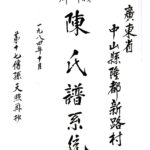
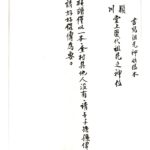
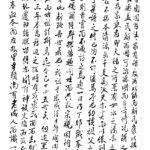
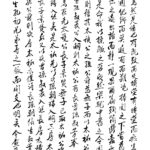

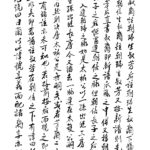
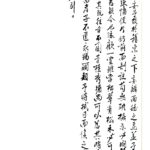
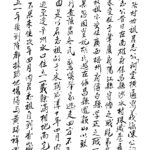
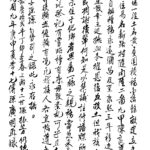
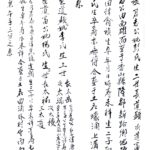
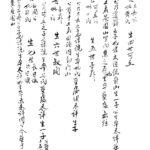
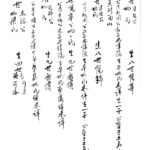
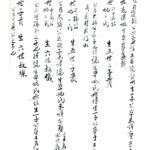
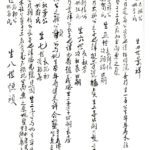
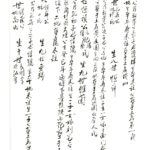
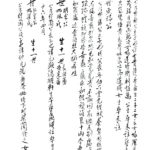
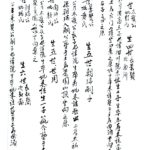

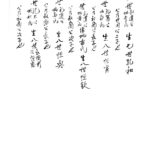
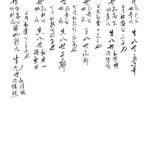
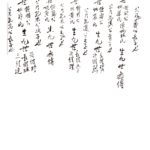
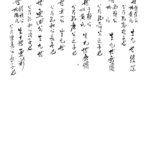
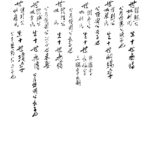
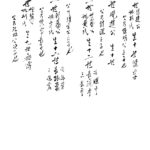
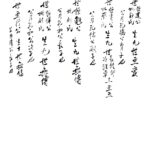
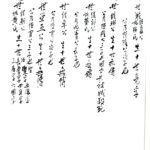
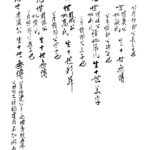
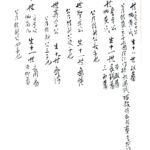
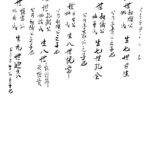
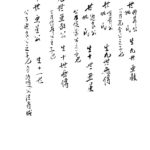
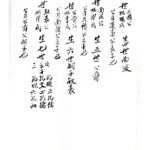
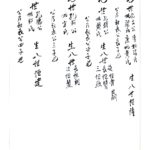
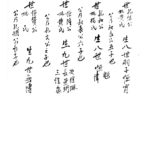
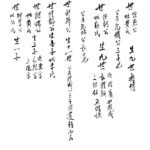
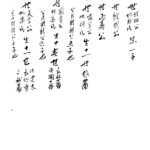
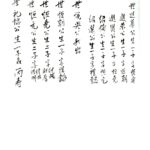
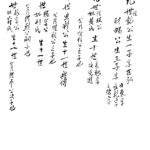
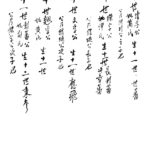
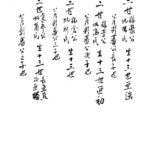
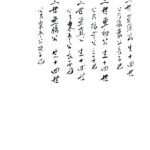
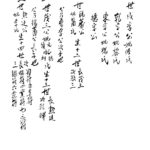
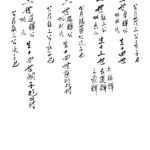
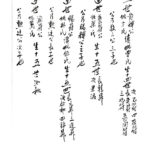
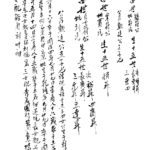
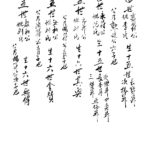
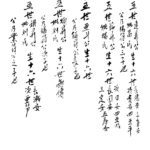
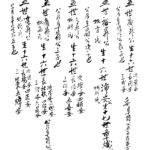
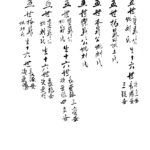
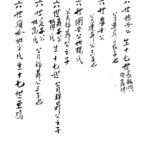
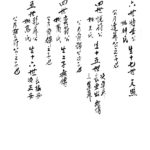
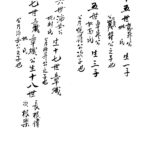
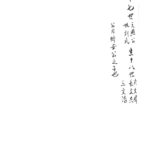
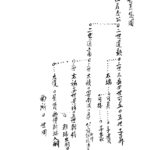
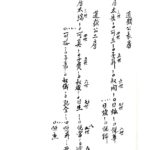
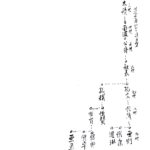
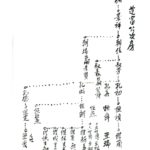
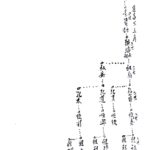
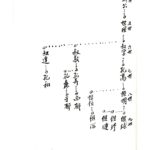
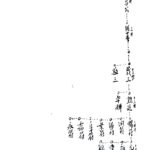
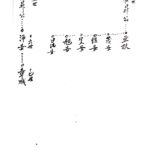
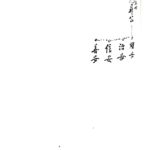
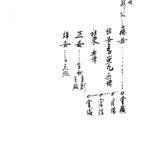
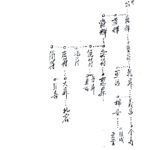
The last two entries in the book are my dad’s and Uncle Ed’s Chinese names… the represent the 18th Generation.
After 35 years, we finally have a translation of the first 9 pages of this document!
It is said that every country has its own laws, and every family has its own family genealogy. So the emperor of the Shang Dynasty carved an inscription on copper plating to instruct his people, and King Kang of the Zhou Dynasty released a proclamation to promote virtuous behavior. The country can be governed well only if its people are aware, and the quality of the people will be enhanced only if virtue is promoted, so too the family genealogy is the foundation of the family. The function of the family genealogy is like the origin of the river, the roots of the trees. If one does not know the roots of the tree, the origin of the river, there would be no way to unify hundreds and thousands of branches and tributaries. So to create our genealogical records is an urgent task! I read the genealogical records written by our ancestors when I was a child, but it no longer existed by the time I reached adulthood. I searched for our family records everywhere, until one day, in March, 1807, on a sightseeing trip, I met a clansman with the same family name in Longdu. I asked him about our Chen family genealogical records and found out this is where our family has lived for many generations. Our ancestor moved from Nanxiong in 1274. Since then, fourteen or fifteen generations have lived there. But in 1664, when our family members received imperial orders to emigrate, some went east, some went west, some moved to the south, and some moved to the north. Even our genealogy was burned. In later years, the ruler showed mercy to our family members, and allowed them to return to our hometown—Xinlu Village. Luckily we had a clever elder, who, realizing the importance of genealogical records, had saved a copy.
In this genealogy, there are records of people who passed away but no notations of where they are buried; there are records of burial sites without dates of birth and death; there are records of people who moved away but no account of their return; there are many records which are not reliable. I sighed while I was reading these accounts; then I took up the record and checked it carefully once again—it is true that the genealogical records are fragmentary and incomplete, and full of insect infestation; they are not legible. Therefore I happily take on the task of sorting out our genealogical record.
First, let us investigate the grandson of Taijigong. Because this Duke had no son, he adopted Taiyougong’s 2nd great grandson Shubiao, leaving Taiyougong his oldest great grandson Shufang to inherit the family business. Before this, the first son of Taihuogong, named Jingxian, also did not have a son, so he had already adopted Taijigong’s 2nd grandson, Zhaorui. Taiyougong first had his 2nd grandson Zhaorui adopted by the 3rd wife Huogong’s first son Jingxian, then he had his 2nd great grandson Shubiao adopted by the first wife. So Taiyou’s family only had the first grandson Chaoxin left to them. Chaoxin had a son named Shufang, and Shufang had Kongchu and his brother, so this branch of the family is very clear. Today I checked the old records; they confirm that that Shufang is Zhaoxin’s first son. Shufang in turn had two sons, the elder named Kongchu, and the second named Konghua. Kongchu’s offspring Weilan had two sons: Mingfu and Hongfu, this is recorded. Konghua’s offspring, named Yarui, left in fear after having a fight with the Tang family; now I find out that he lived in Datuo—there is evidence of this. Given all the above facts, the families we are considering now are the direct descendant of Taiyougong.
If one read the notes on the old record, they say that Zhaorui had two sons: the older son was named Shuyi, and the 2nd son was named Shuqi. Shuyi also had two sons: the older son was named Kongpan, and the 2nd son was named Konghan. The offspring of Kongpan, Yacai, had gone into the city for business when his family was robbed. He died of illness in 1676 (the 15th year of the Kangxi reign period); therefore Shuyi’s first son had no heir. Hengqin, the son of Shuyi’s 2nd son Konghan, was killed in the war. He too had no son and his wife Liang Lin remarried, so it is a fact that the 2nd son of Shuyi did not have an heir. But the old record first says Zhaoxin had a son named Shuyi, and Zhaorui had a son named Shufang. Then it says Zhaorui had a son named Shuyi, and in the following chapter it switches back to say that it was Zhaoxin who had the son named Shuyi, and Zhaorui who had the son named Shufang—the records are muddled and erroneous.
What is more, the new record dropped Shufang and wrote Shuyi under Zhaorui, which is to say that in the new genealogical record, Hengxian, the offspring of the first son of Zhaorui, was linked to Zhaoxin’s family line, but Zhaoxin’s oldest son’s offspring Hengzhen was connected to Zhaorui’s family line. If this is true, then after Taiyougong gave one grandson to the 3rd wife, and one great grandson to the first wife. Now it is wrong to connect the offspring of Chaoxin, Hengzhen, to the Huogong family line. In that case, the second son Taijigong would have had no offspring. Or, maybe it was recorded wrong in the old record, and the characters Fang and Yi are confused; this is hard to confirm.
If we look at the context, this is absolutely wrong. In the old record, Chaoxinzi Shufang has a son, whose name is Deguang, and was called Rilan. The meanings of this person’s proper name, style name, and pseudonym do not match the meaning of the family name. Therefore I write the correction here after my research. I am a lazy person, thus my interpretation is only based on the old record. Without any solid evidence, I must keep it to myself and not say it aloud. Now I look around at all my family; although there are many young and strong individuals, no-one knows what happened in the past. Fortunately, I also see the cream of the crop in our family—those who can make a difference in the future. It is said: as long as we have filial children, we will be blessed forever. I am opening my eyes wide and waiting to see this happen. The above words will serve as the preface of our family genealogy.
There is a horizontal inscribed board on the Chen Ancestral Temple in Xinlu Village, engraved “ Ancestral Temple of Yihan ()”. Junzhi used to live in Nanxiong City,
Baochang District, Shashui Village, Zhuji Lane. He worked as a defense officer in the Yangjiang District of Zhaoqing City. His younger brother Juncheng (Taishu) was in charge of education in the Zhuanbai District of Guangxi Wuzhou City. They had lived there peacefully until one day Ms. Wu, one of the many wives of the Song Emperor, ran away from the palace. She escaped to Fendian Mountain of Baochang District. Thus, the royal court ordered to search the area intensively. Local residents were horrified and ran away with their families, not daring to return home. Under this circumstance, our ancestor Junzhi and his brother escaped to Shuikou Village of Lianping State, in April 1274. They purchased land and built a new home within the first year of their arrival. Because the family of his younger brother was not with them, Junzhi moved to Xiangchengxi. After he lived there for one year, he purchased a plot of land from Huangruixiang in Longdu Village. This 10-acre piece of land was originally named Huangwu Garden. He renamed it Xinlu Village after a new home was built. The new home was registered under Kailong 2 Bi 9 A of Chenliangbao. They paid the Grain Tax to the government regularly, with the hopes of settling and prospering there forever. Unfortunately, in 1664, the government implemented a new policy of moving residents inland, to border areas where the population was low. Thus our family was forced to separate again. Fortunately, Inspector-General Wong did us a favor, allowing those who moved away to return. Most of the older generation who had knowledge of our family have now passed away, so how could the young offsprings know what happened in the past? Therefore we got together to discuss the need to interpret our old genealogical records, and write our new records. So when we worship our ancestors, we will maintain the right order, shall we?! We must edit our genealogical records every decade, so it is well documented for our future generations. Our family must follow this convention of making an update every decade, and never forget. Please keep it going for our offspring! I hereby record all these matters, as a record for eternity.
March 1807 recorded by Zhenfang, the 12th generation grandson
Summer 1920 recorded again by Guangming, the 17th generation grandson